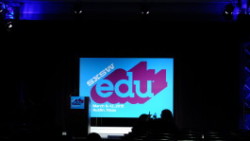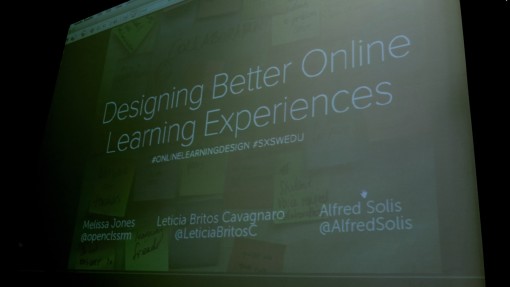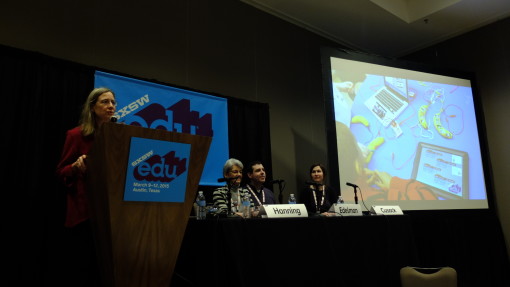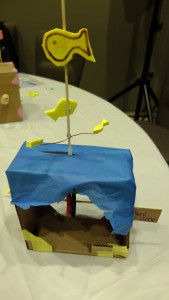Mindlessly ‘twittering’ late one night I managed, by complete surprise, to win free admission to the SXSWedu conference from March 9–12 in Austin, Texas, courtesy of TES Global.
So here’s a brief conference report on my highlights of the conference.
Who says that twitter doesn’t pay?
1) Designing better online courses
There were a lot of corporate presentations at SXSWEdu but there was also space for what teachers really get a buzz out of — pedagogy. Remember that old, dusty word?
Moreover, when I spoke to other teachers at the conference, pedagogy was what many of them were thirsty for. So this hands-on workshop, led by Leticia Britos Cavagnaro from Stanford University, Melissa Jones from Adobe and Alfred Solis from the Buck Institute, was full of eager faces.
Situated in the plush, carpeted rooms of the Hilton Hotel this was an interactive session where we were paired up and taken through a design process for creating an online course starting with…….values?!
You mean we don’t start designing a course with content?
The ‘aha’ moment flashed across the room: to sustain engagement in online learning start with the values you and the learners are bringing to the whole project. Using the metaphor of a tree, it is these values that will motivate and sustain both the learning and the teaching as the project progresses. The values act as the roots of your online learning community and project.
What a simple, yet overlooked idea? In the past few years I have started working with Moodle and different LMS systems and it seems that when designing online courses content is king, which is surely the wrong approach. If online learning isn’t better then traditional learning – then why do it?
pedagogy. Remember that old, dusty word?
Please find below a pdf of the Online Learning Design Canvas used in the session (licensed under Creative Commons Attribution-NonCommercial-ShareAlike 4.0 International License).
onlinelearningdesign-canvas.pdf (373 downloads)
2) Makerspace Mash-up: New Literacy from AR to Z
The Makerspace was organised by Jacy Edelman, Kreg Hanning and Sue Cusack of Lesley University in Massachusetts and was introduced by an impressive video made by their learners. There were several ‘stations’ where we were left to our own devices to play and experiment. I spent most of the time at the ‘automata’ station but I also tried the ‘squidgy circuits’.
Once we were invited to try out the activities we all dived in; educators love going back to school! The activities were laid out and organised very well; there were instruction booklets with pictures; there were also tablets with further explanations which you could flick through. In the Makerspace the teacher becomes a facilitator rather than organiser which is one of the ideas I’ve been trying to push with decentralised teaching and learning.
And here is my automata!
Two things really struck me during this workshop. For introverted learners this kind of makerspace is ideal; you have full control over your environment and can take the exercise as far as your imagination stretches, while still having some support.
There’s also something special about making something, through making a different kind of knowledge is constructed. This is the essence of constructionist learning theory – through making things we learn about concepts, processes and ideas at a deeper level.
the teacher becomes a facilitator rather than organiser
This Makerspace made me reflect on my classes; coming from a Fine Art background I often get my learners to construct things in class. How might this work with constructing language: sentences and paragraphs? My German learners also struggle with the difference between English and German syntax – a makerspace might be a good place to explore this.
This film was part of a edufilm programme shown during the conference. This film was screened at the Alamo Drafthouse theatre, where they take your drink and food order while you lie back and relax!
The film focused on two schools, one Palestinian one Jewish, and showed how their different education systems represent both their own side, and the ‘Other’. It’s both a sombre and, at times, entertaining analysis of the school systems in both communities. One sub-plot that I found fascinating was the obvious tensions between two teachers, one Arab and one Jewish, who were co-teaching a mixed class in an international school. You could sense the emotional strain as the learners were being taught two versions of history at the same time (and I thought learning the kings and queens of England was difficult).
It was surprising to me how much the children reflected the values and viewpoints of their education systems; meaning there was little room for critical thinking in their worldviews. The Jewish education system in particular, didn’t seem to promote much critical thinking in the learners, although Israel is a modern, democratic, wealthy state.
The message I took away was that if education consists merely of transmitting the values of the previous generation to the young, then we’re in trouble.
Takeaways?
Throughout the conference I kept hearing the phrase ‘What’s the takeaway here?’. For Brits, a takeaway is usually a plastic bag full of Indian food that comes after too many drinks. But in US conference-speak a takeaway is ‘the main message you can take away’.
So my ‘takeaways’ are:
How can I design better online learning activities incorporating deeper levels of engagement (e.g. starting with values)
How can I build in better activities for introverted learners?
What would an ELT Makerspace look like?
Finally, a big thanks to the SXSWedu team for a fascinating conference, and to the friendly locals of Austin for showing us a good time!




OK a propos online learning design and at the risk of sounding/being thick, what do you mean exactly by “values” Paul? It seems open to a varied definitions including some horrible vague (teflese) ones.
Value – Deep beliefs which guide action IMO. If you take action without sharing beliefs -then you risk a values clash down the road.
.. must learn to error check before posting messages, sigh